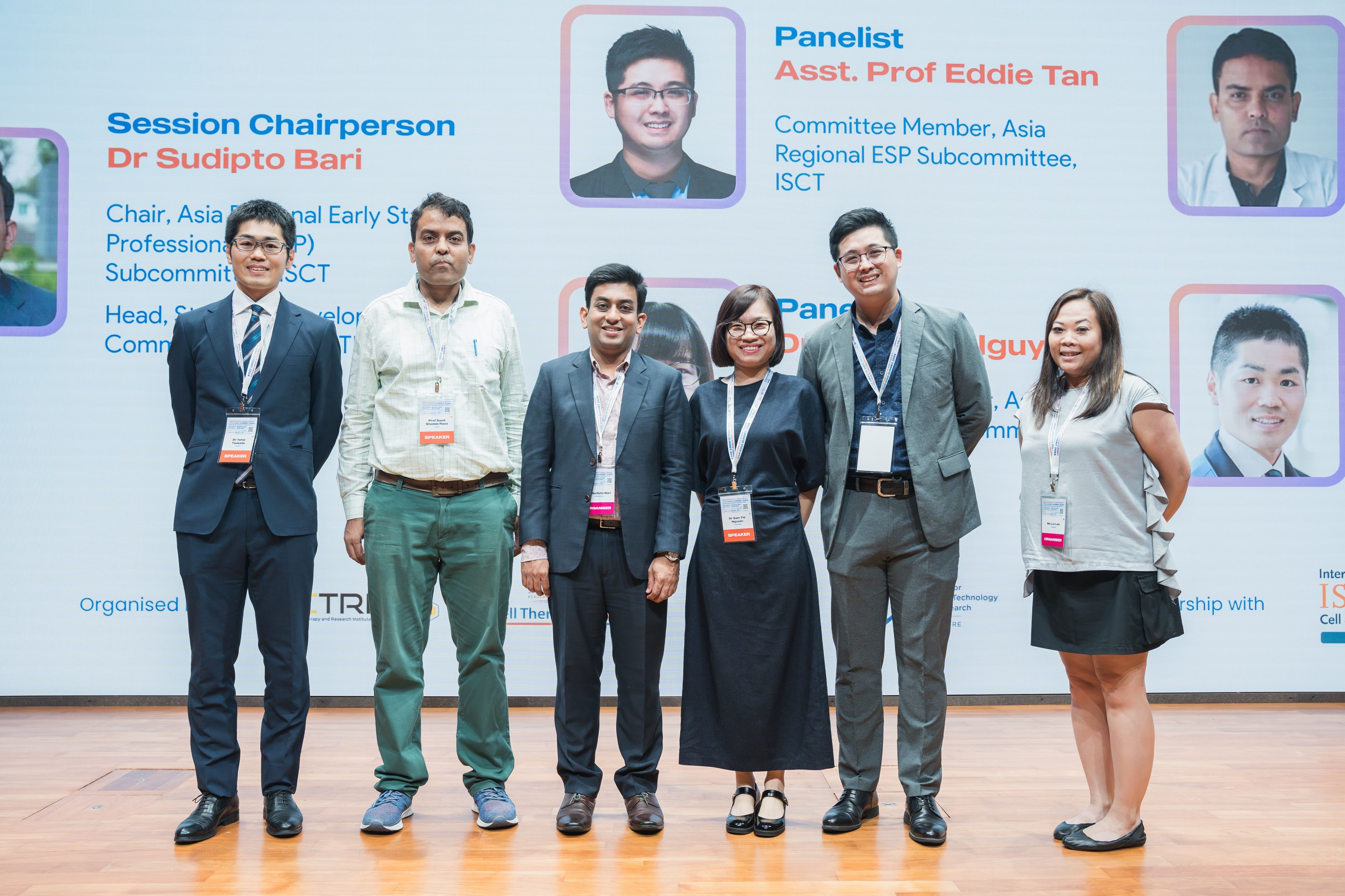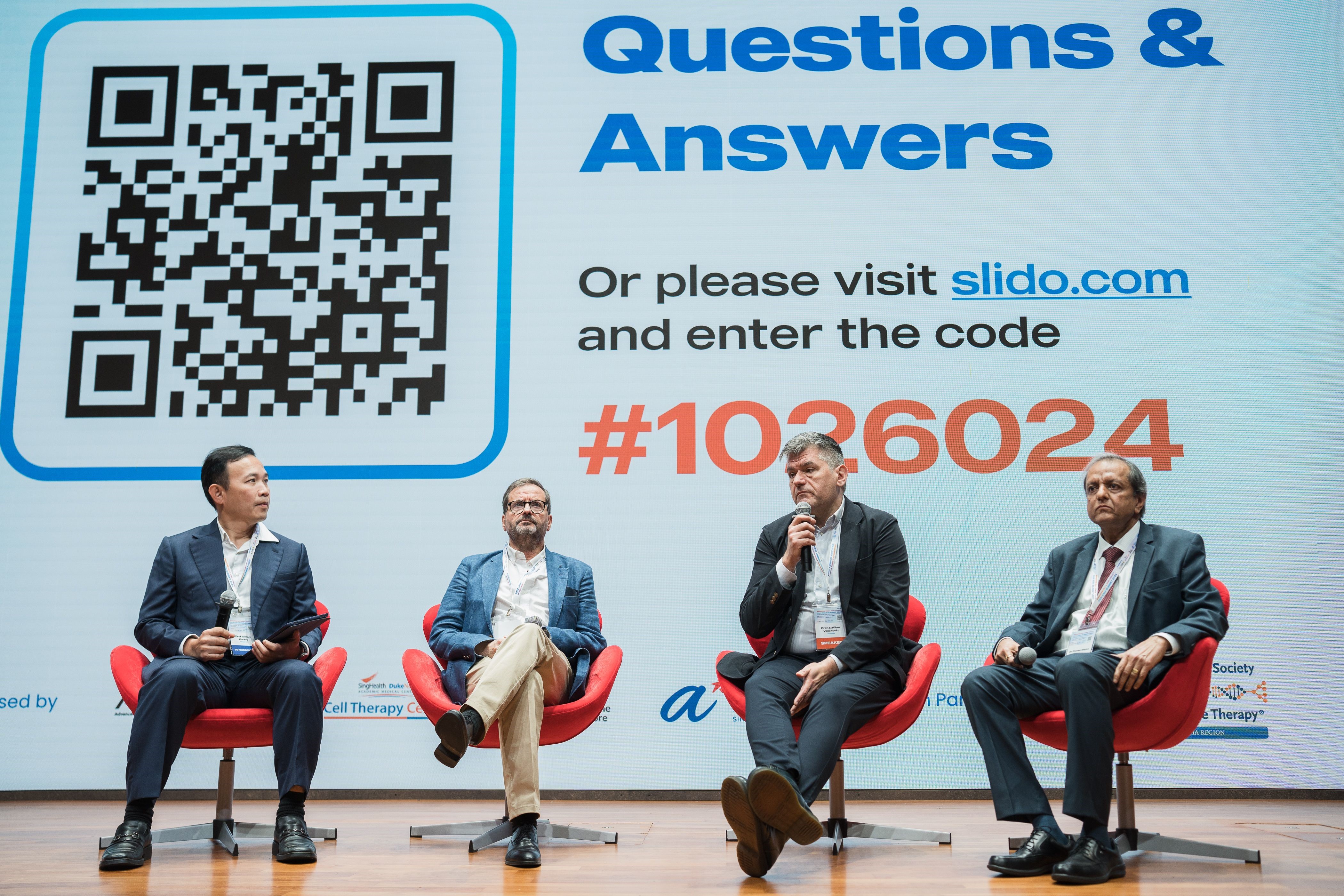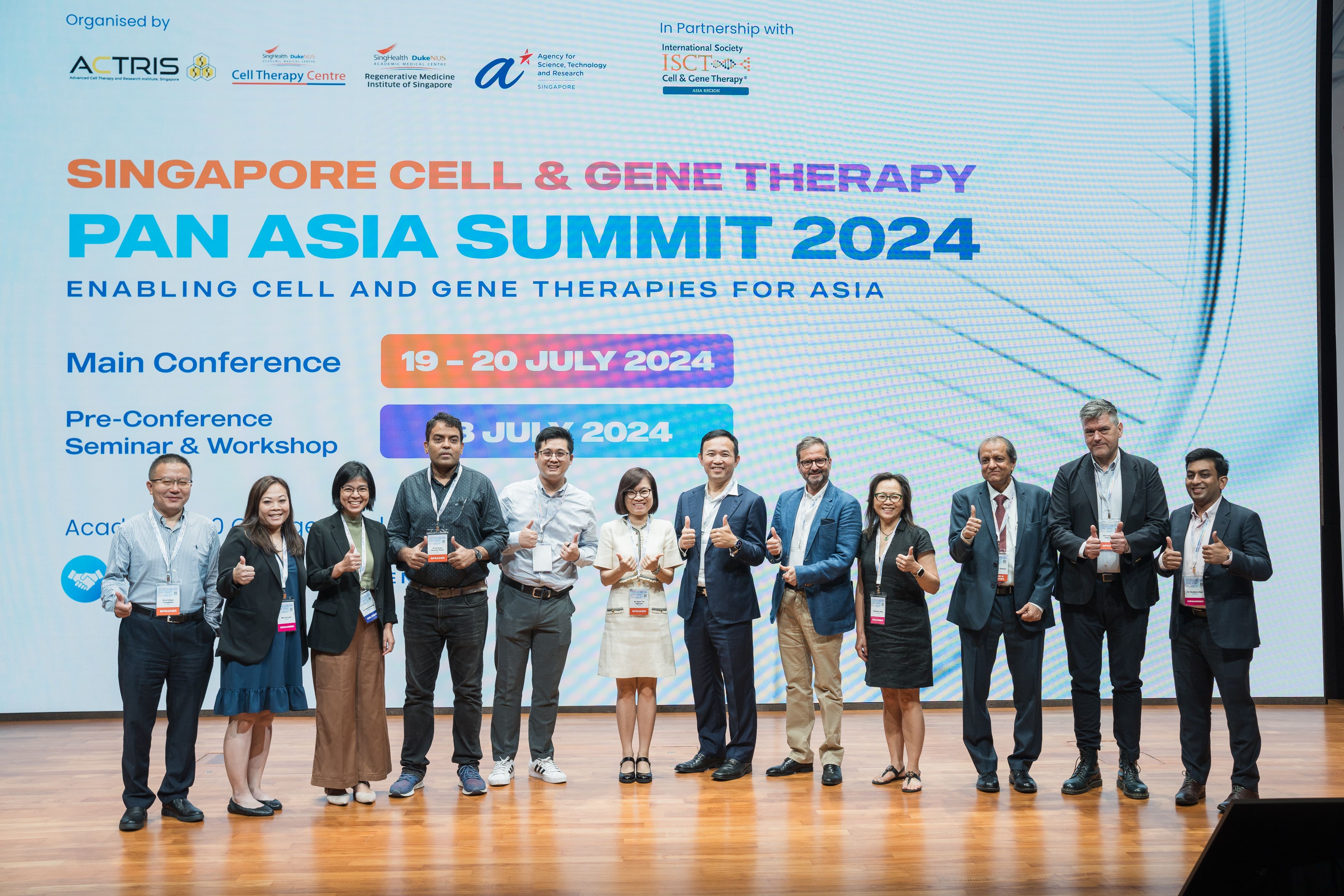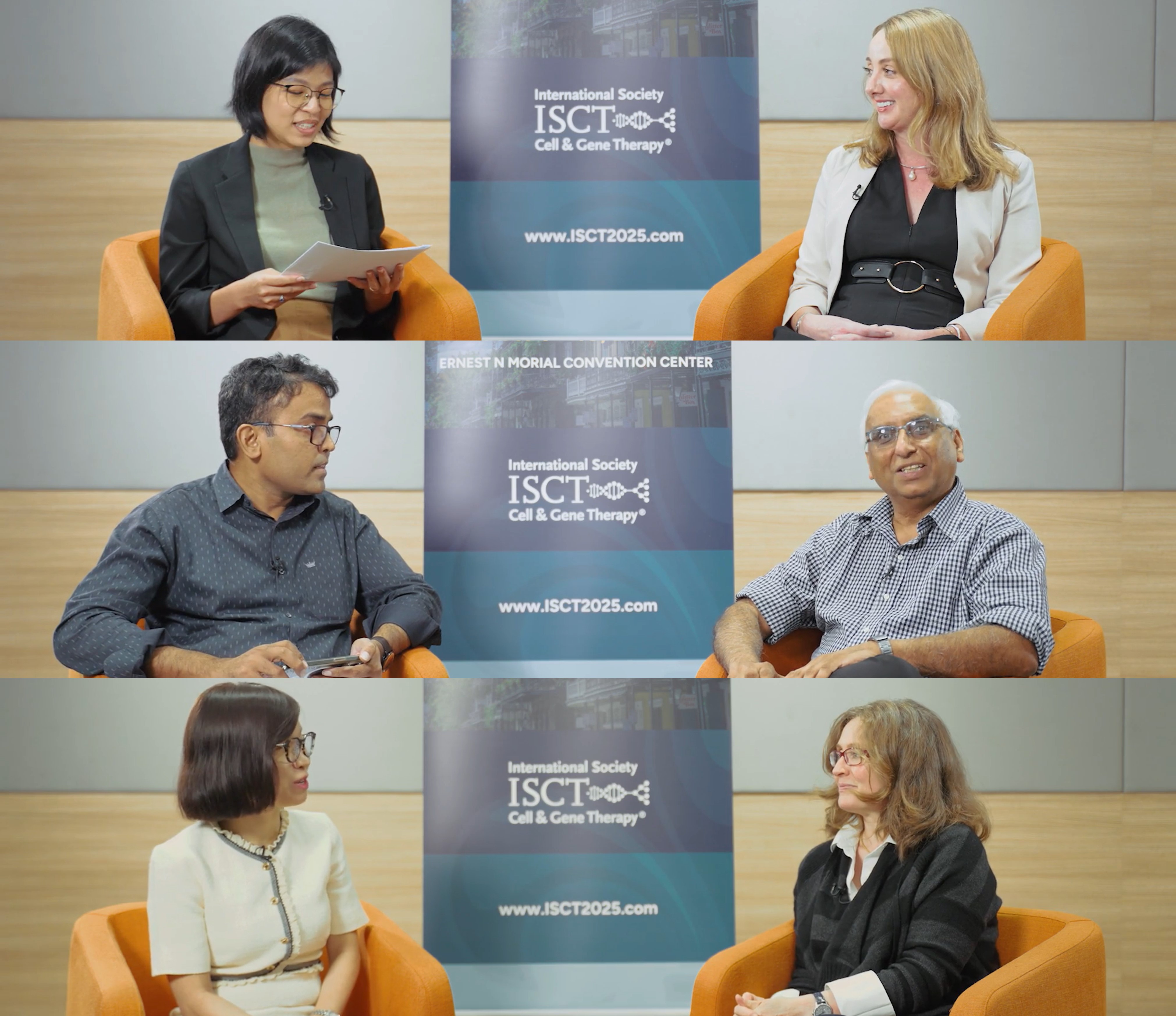On behalf of ISCT Asia Regional ESP committee
Eddie Tan, PhD
Assistant Professor
Centre of Regulatory Excellence (CoRE), Duke-NUS Medical School
Singapore
Natasha Hui Jin Ng, PhD
Senior Scientist
Institute of Molecular and Cell Biology (IMCB), Agency for Science, Technology and Research (A*STAR)
Singapore
The Singapore Cell and Gene Therapy Pan Asia Summit 2024 (SCGT) was held in partnership with the International Society for Cell and Gene Therapy (ISCT). The conference featured two days of events on the 19th and 20th of July 2024, with a pre-conference seminar and workshop on the 18th of July.
The theme for this year was “Enabling Cell and Gene Therapies for Asia” and brought together Cell and Gene Therapy (CGT) leaders from international locations to share their experiences at the meeting. The event also featured several segments organized in partnership with ISCT, showcasing the range of opportunities and value that ISCT brings to the Asian community. We bring you a recap from each of these segments.
1. ISCT Early Stage Professionals (ESP) Roundtable Discussion: Cell Therapy Trends in Asia at the Pre-conference seminar and workshop (18 July 2024):
This session featured several Early Stage Professionals (ESPs) from the ISCT Asia Regional, who shared about the research community, clinical translation activities and the biotechnology start-up ecosystem in their respective countries. The ESP representatives for this session are Eddie Tan PhD, MTOPRA, CABP (Duke-NUS, Singapore), Prof Syed Raza, PhD, FRSB (Eras Medical College, India), Sam Ngyuen, PhD (Vietnam) and Yohei Tsukada, PhD (Rohto Pharmaceuticals, Japan). The session was chaired by Sudipto Bari, PhD, MBA (ACTRIS, Singapore) who is the co-chair of the ISCT Asia Regional ESP committee. Sudipto provided an overview of the session, as well as an introduction to the activities of the ISCT Asia Regional community.
Each ESP representative provided insights into the CGT ecosystems in their respective countries. Eddie Tan highlighted the good progress of Singapore in building the infrastructure to facilitate the growth of CGT, but also pointed to the tough challenges related to patient access. Prof Syed Raza gave a passionate representation on the reasons to choose India as a location to develop new CGT candidates, citing the international collaborations and cost advantages. Sam Ngyuen showcased the national efforts in Vietnam to promote CGT and made a call to action to improve CGT efforts in Vietnam with more international collaborations. Yohei Tsukada provided a summary of Japan’s mature physical infrastructure, and support from government and industry initiatives such as FIRM (Forum for Innovation Regenerative Medicine).

Roundtable Session Speakers
2. ISCT Joint Symposium (ANZ & Asia) (20 July 2024):
This session was chaired by ISCT Regional Vice President (Asia), Prof William Hwang, MBBS, M Med (Int Med), FRCP (London), FAMS (NCCS, Singapore) and featured esteemed speakers from the ISCT Leadership.
Evidence-Based Cell and Gene Therapies: Global Development for Local Benefit
Prof Miguel Forte (ISCT President) gave an overview of the global CGT landscape, highlighting Asia as a growing region for CGT development. He also discussed the many ISCT resources and initiatives that provide training, deep insights and thought leadership in the field. Overall, Prof Forte highlighted key developments to note, such as decentralized manufacturing, rapid manufacturing and novel engineering designs, while also cautioning the challenges to address in terms of regulations, logistical challenges, workforce development and funding.
Decentralizing Innovation: Unlocking the Potential of Distributed Manufacturing for Cell and Gene Therapies
Adj A/Prof Zlatibor Velickovic (Immediate Past ISCT Regional Vice President, Australia and New Zealand Region) presented on the practical models of manufacturing and distribution in CGT. He made comparisons between the Centralized Model and Decentralized/Distributed Model, using CAR-T therapies as a case study, and presented the opportunities and challenges of each model. He also provided useful references to various resources within ISCT that could help bridge these challenges.
MSCs in the Clinic: Success & Failures and Future Prospects
Dr Pawan Gupta (ISCT Regional Vice President Elect (Asia)) discussed the topic of Mesenchymal Stromal Cells (MSCs), highlighting the global trends, clinical outcomes and challenges of MSCs as a therapy. He then shared the strategies used by his company, Stempeutics, in successfully navigating these challenges. The presentation also covered some of the exciting developments in the field of MSCs.
Question and Answer Session
The ISCT Joint Symposium wrapped up with a roundtable panel discussion with the speakers, Prof Miguel Forte, Adj A/Prof Zlatibor Velickovic and Dr Pawan Gupta. The panel session was moderated by Prof William Hwang. The panelists answered enthusiastic questions from the audience, and emphasized the importance of a collaborative approach to address the challenges in CGT, and again underscored the value that an organization like ISCT brings to the regional ecosystem, by connecting experts across the regulatory, industry and academic pillars of the organization.
[Group photo of panel speakers here and panel speakers with other ISCT members here – Image 2 & 3]


3. Highlights from ‘In Conversation with CGT Leaders’
On the sidelines of the Summit, several one-on-one interviews were held with CGT leaders who have diverse expertise across academia, biotech, industry, and regulatory affairs, to hear their take on the CGT landscape and to collect some inspiring words of advice for ESPs. The six CGT leaders featured are: Kasey Kime (ISCT Legal and Regulatory Affairs Committee, Thermo Fisher Scientific; Adj A/Prof Zlatibor Velickovic, PhD (Immediate Past ISCT Regional Vice President (ANZ), Facility Director, Cell & Tissue Therapies, Royal Perth Hospital); Prof Miguel Forte, MD, PhD (ISCT President, Kiji Therapeutics); Dr Mahendra Rao, MBBS, PhD (Vita Therapeutics); Prof William YK Hwang, MBBS, Mmed, FRCP, FAMS (ISCT Regional Vice-President (Asia), National Cancer Center Singapore); and Dr Aude Chapuis, MD (Fred Hutchinson Cancer Center).
Hosted by Dr Natasha Ng, PhD (IMCB, A*STAR, Singapore), Prof Syed Shadab Raza (Eras Medical College, India) and Dr Sam Thi Nguyen (Vietnam), the conversations served as an intimate platform to hear about their career journey, their take on the challenges and opportunities in the field, and more importantly, the key technical and soft skills that early career professionals should take note of. As the senior leaders dedicate part of their time to growing the next generation of CGT professionals, their nuggets of wisdom will serve as an inspiration and reminder of the many transferable skill sets that will help in career development.
Strategies to help technology developers reach the clinic
Several leaders highlighted the need to consider raw material supply, equipment, manufacturing and testing conditions early in development, with the end goal of where the product will be marketed in mind. Understanding the regulatory pathway for the product early enables developers to influence the technology development early on, in a way that facilitates the translation of research to clinic. Additionally, Dr Chapuis highlighted that the whole pathway from research design to patient is such a long journey that the technology in development could risk being outdated in the end. Finding ways to accelerate this translational time is of critical importance. Another challenge that was addressed by multiple leaders was the need to substantially lower the cost of the therapies, as this would be a game changer for more patients.
Important technical skill sets for Early Career Professionals
A few pertinent areas surrounding future-proof technical skills were discussed by the leaders. The first was strong fundamental understanding of molecular biology and a high level of competency on molecular biology and cell engineering techniques. Both Prof Hwang and Dr Chapuis further emphasized the ability to work well with cells i.e. being good cell farmers, and the need to spend ample time in the lab to hone such skills and to generate data. The second, as Adj A/Prof Zlatibor highlighted, were skills related to operating within the cleanroom environment, including aseptic technique, contamination controls, and the use of devices and materials within the cleanroom, which requires very careful handling. Many of these skills take a long time to master, and the investment in such training should not be underestimated. It was emphasized that developers should prepare for the pre-GMP phase early on during R&D, and to start conducting process development and planning in that transition early on to ensure a smoother translation from research to clinical Phase I. Thirdly, data science and computational skills, including the ability to access data and mine data, the use of AI platforms, will rise in importance dramatically as these skills help to enhance the discovery and manufacturing process. For instance, AI and data-mining tools will help to more effectively home in on targets and aid the monitoring of the cell manufacturing process to improve cell quality and reduce the occurrence of batches that are out of specification. Lastly, Prof Forte shared that clinical experience adds a valuable perspective that allows one to consider the desired end results of the technology and provides better understanding of patient needs and the benefits to them.
Transferable soft skills
As for soft skills which are often transferable, many of the leaders discussed the need for a high level of adaptability and being prepared to change quickly. As aptly put by Kasey, it is important to recognize that all learnings are valuable, as change in the course of work, over time, is expected and that it is acceptable to move from one area to the next. It is now an expectation that things will always change, and possessing strong fundamentals that one continuously builds upon will provide a source of stability. Other soft skills highlighted include paying attention to detail, thoroughness of the scientific mind, good communication, prioritizing and managing time, being rational and knowing how to question oneself and others, and the ability to learn with an open mind and accept different perspectives. When it comes to skills that will likely drive one’s career, a passionate commitment, attentive curiosity, strategic resilience and active integration into the ecosystem, are key focal areas.
Future of Cell and Gene Therapies:
Finally, when given a crystal ball to gaze into the future of CGT, several of our CGT leaders highlighted up and coming modalities such as in vivo gene editing and the use of AI to drive manufacturing and clinical processes to improve patient outcomes. As we now know how to engineer cells towards a desired function to deliver a therapeutic purpose, Dr Rao shared a future in which we would see even more tools and deeper knowledge to modify and edit cells for a specific purpose, whether for in vivo or ex vivo therapy. He also emphasized the importance of addressing the needs that are relevant to the geography that one plays in, such as those in Asia that may not necessarily be relevant across the globe, as that is when real impact could be felt on society. A greater harmonization of regulations and increased collaboration across different countries and sites was also a commonly shared sentiment. Others shared about focusing efforts on fostering patient access, through optimizing the cost of development and bringing down costs to the patient, and instilling confidence in the use of the novel therapies. There remains much promise for Asia’s place in the future of CGT. Asia currently sees about 20% of the global CGT clinical trials, and the pace of growth in Asia far exceeds many parts of the world. The leaders were optimistic about the continuing growth of Asia within CGT and were further encouraged by the growing membership of Asia within the ISCT network.

To catch the interviews in full, log in to the ISCT learning resource for the videos of the inspiring conversations with the CGT leaders. Link: International Society for Cell & Gene Therapy: In Conversation with CGT Leaders
#RegionalandPartnerUpdates